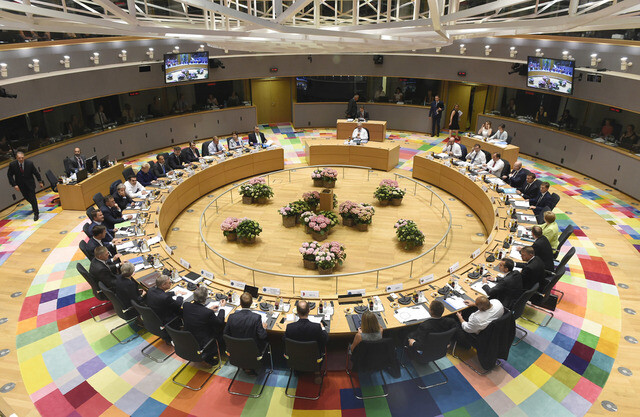hankyoreh
Links to other country sites 다른 나라 사이트 링크
EU removes South Korea from tax haven blacklist

South Korea has been removed from a list of “non-cooperative tax jurisdictions” as designated by the European Union around a month and a half ago. The Ministry of Strategy and Finance announced on Jan. 23 that the EU Economic and Financial Committee had decided to remove South Korea from its “tax haven blacklist.” The decision was made after tax system revisions this year by the administration, which pledged to improve and supplement its tax support system for foreign-invested companies to bring it in line with global standards.
Eight of the 17 countries previously included on the “non-cooperative” list were also removed, including Panama, the United Arab Emirates, Mongolia, and Barbados. On Dec. 5, the EU designated South Korea as a non-cooperative tax jurisdiction on the grounds that its tax support system for foreign investment companies, which provides tax support for foreigners investing in Free Economic Zones and companies with new technology, was a “harmful tax regime.” The designation caused some controversy, with South Korea as the only country of large economic scale to be included as non-cooperative. Critics accused the administration of bringing the tax haven stigma on itself with its belated measures.
The Ministry of Strategy and Finance objected vehemently to the tax haven classification, arguing that the EU had “infringed upon tax sovereignty and violated international standards.” But it later changed tack by acknowledging and taking action to remedy problem areas with the domestic system for foreign investment. Its move was based on the conclusion that large-scale investment support to foreigners through the tax system was an ineffective approach, and that almost no other country anywhere in the world allowed investment only to non-resident foreigners.
With its 2018 economic policy course announced in late December, the administration said it planned to “shift the focus of various domestic support systems to attract investment, including support for foreign investors and U-turn enterprises, toward new and job-creating industries” – signaling that it may abandon the discriminatory foreign investment support regime criticized by the EU.
By Bang Jun-ho, staff reporter
Please direct questions or comments to [english@hani.co.kr]

Editorial・opinion
![[Column] Park Geun-hye déjà vu in Yoon Suk-yeol [Column] Park Geun-hye déjà vu in Yoon Suk-yeol](https://flexible.img.hani.co.kr/flexible/normal/500/300/imgdb/original/2024/0424/651713945113788.jpg) [Column] Park Geun-hye déjà vu in Yoon Suk-yeol
[Column] Park Geun-hye déjà vu in Yoon Suk-yeol![[Editorial] New weight of N. Korea’s nuclear threats makes dialogue all the more urgent [Editorial] New weight of N. Korea’s nuclear threats makes dialogue all the more urgent](https://flexible.img.hani.co.kr/flexible/normal/500/300/imgdb/original/2024/0424/7317139454662664.jpg) [Editorial] New weight of N. Korea’s nuclear threats makes dialogue all the more urgent
[Editorial] New weight of N. Korea’s nuclear threats makes dialogue all the more urgent- [Guest essay] The real reason Korea’s new right wants to dub Rhee a founding father
- [Column] ‘Choson’: Is it time we start referring to N. Korea in its own terms?
- [Editorial] Japan’s rewriting of history with Korea has gone too far
- [Column] The president’s questionable capacity for dialogue
- [Column] Are chaebol firms just pizza pies for families to divvy up as they please?
- [Column] Has Korea, too, crossed the Rubicon on China?
- [Correspondent’s column] In Japan’s alliance with US, echoes of its past alliances with UK
- [Editorial] Does Yoon think the Korean public is wrong?
Most viewed articles
- 1[Column] Park Geun-hye déjà vu in Yoon Suk-yeol
- 2N. Korean hackers breached 10 defense contractors in South for months, police say
- 3Will NewJeans end up collateral damage in internal feud at K-pop juggernaut Hybe?
- 4[Cine feature] A new shift in the Korean film investment and distribution market
- 5[Editorial] Japan’s rewriting of history with Korea has gone too far
- 6[Column] ‘Choson’: Is it time we start referring to N. Korea in its own terms?
- 7Kim Jong-un expressed ‘satisfaction’ with nuclear counterstrike drill directed at South
- 8[Editorial] New weight of N. Korea’s nuclear threats makes dialogue all the more urgent
- 9[Column] The clock is ticking for Korea’s first lady
- 10Senior doctors cut hours, prepare to resign as government refuses to scrap medical reform plan